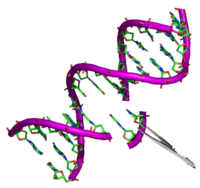
Photo from wikipedia
INTRODUCTION The recent approval of Spinraza (nusinersen), an antisense oligonucleotide, by U.S. Food and Drug Administration to treat patients with spinal muscular atrophy, has reignited interests of researchers in designing… Click to show full abstract
INTRODUCTION The recent approval of Spinraza (nusinersen), an antisense oligonucleotide, by U.S. Food and Drug Administration to treat patients with spinal muscular atrophy, has reignited interests of researchers in designing and testing new gene therapy approaches to treat neurological disorders, in particular, to curb neurodegenerative diseases of the central nervous system which represent an ever-increasing public health burden to today's society. CONCLUSION This review highlights several key factors to be taken into consideration to design successful preclinical and clinical gene therapy experiments with respect to the vehicle of delivery and the route of administration to CNS-specific targets, with an additional focus on antisense oligonucleotide therapy and recent clinical trial developments.
Journal Title: Current gene therapy
Year Published: 2017
Link to full text (if available)
Share on Social Media: Sign Up to like & get
recommendations!